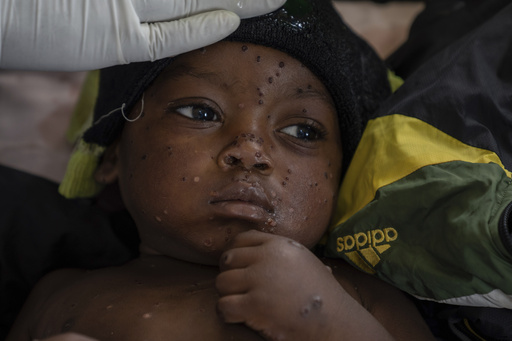
GENEVA — The World Health Organization (WHO) has given the green light for the first mpox vaccine aimed at children, a move that experts believe will enhance the availability of immunizations for one of the most severely impacted demographics during the ongoing outbreaks in Congo and other regions in Africa.
In a statement released late Tuesday, the UN health agency indicated that it has approved the mpox vaccine produced by Japanese firm KM Biologics for administration to children over one year old, provided it is given as a single dose.
Recent reports from the charity Save the Children highlighted a significant increase in mpox cases among individuals under 18, estimating a rise of over 130% in Congo alone, with more than 25,000 suspected cases reported.
The charity emphasized that children are nearly four times more at risk of fatality from the latest strain of mpox, which was first identified in eastern Congo earlier this year. The disease, closely related to smallpox, commonly presents symptoms such as fever, rash, lesions, and fatigue.
“Children are particularly susceptible to mpox,” stated Dr. Katia Veira de Moraaes Lecasse from Save the Children. “Their natural curiosity leads them to explore with touch and taste, and they often lack a full understanding of health guidance. Moreover, their immune systems are not as robust as those of adults.”
Research has revealed a concerning trend, indicating that children seem to be disproportionately affected by mpox in both Congo and Burundi, which together account for more than 90% of cases reported in Africa’s ongoing outbreak.
Previously, WHO had granted approval for the Bavarian Nordic-produced mpox vaccine for individuals aged 18 and over. However, they indicated that healthcare providers could consider administering it to younger patients if they determined that the advantages outweighed any potential risks, particularly in light of the limited data available for children and certain other demographics, such as pregnant women.
Last week, WHO mentioned that the number of mpox cases in the Congolese area where the new, more transmissible variant was first found seemed to be stabilizing, even as cases were observed to be increasing in other regions, including Uganda and Burundi.
Approximately 50,000 individuals in Congo have already received the Bavarian Nordic vaccine against mpox. WHO announced that Japan intends to donate around 3 million doses of the KM Biologics vaccine to Congo, although it remains unclear whether any of these doses have arrived as of yet.
On Friday, WHO will gather its expert committee to assess if the ongoing outbreaks in Congo and other parts of Africa should still be classified as a global emergency, a designation initially made by the UN agency in August.
So far, Africa has documented over 46,000 suspected mpox cases during this current outbreak, with a reported total of 1,081 fatalities.
